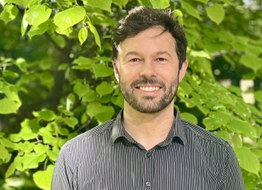Head of the group
Prof. Dr. Philipp Kanske
 © Anja Pixa
© Anja Pixa
Prof. Dr. Philipp Kanske
Send encrypted email via the SecureMail portal (for TUD external users only).
Visiting address:
Chair for Clinical Psychology and Behavioral Neuroscience, Room 315 Chemnitzer Str. 46
01187 Dresden
Office hours:
Appointments after previous agreement. Please send an e mail.
Philipp Kanske is Professor for Clinical Psychology and Behavioral Neuroscience at Technische Universität Dresden. He explores the emotional and cognitive processes that enable social behavior and their alterations in psychopathology. In his work he uses magnetic resonance imaging (MRI) and electroencephalography (EEG) to describe the underlying neuronal mechanisms.
I support the Open Science Initiative of the Faculty of Psychology.
Academic experience
|
since 2017 |
Professor for Clinical Psychology and Behavioral Neuroscience, Technische Universität Dresden |
|
2012 – 2017 |
Group Leader „Psychopathology of the Social Brain” at the Department of Social Neuroscience, Max Planck Institute for Human Cognitive and Brain Sciences, Leipzig |
|
2011 – 2012 |
Research staff at Heidelberg University, Department of Psychiatry, Section of Experimental Psychopathology and Neuroimaging, Heidelberg |
|
2009 – 2011 |
PostDoc at the Central Institute of Mental Health, Institute of Cognitive and Clinical Neuroscience, Mannheim |
Education
|
2014 |
Habilitation at Heidelberg University |
|
2011 |
Licensed Psychotherapist |
|
2008 |
Dr. rer. nat. at the University of Leipzig |
|
2005 |
Dipl.-Psych. at Technische Universität Dresden |
|
2004 |
M.Sc. at the University of Oregon, USA |
Honors and awards
| 2023 | ERC consolidator grant "INTERACT - The interplay of neural networks enabling social interaction" |
|
2017 |
Heinz Maier-Leibnitz Award of the German Research Foundation |
|
2015 - 2020 |
Member of the Young Academy at the German National Academy of Sciences Leopoldina and the Berlin-Brandenburg Academy of Sciences and Humanities (2019 - 2020 Speaker, 2018 - 2020 Member of the Board) |
|
2013 |
Lilly Young Investigator Fellowship in Bipolar Disorder at the International Conference on Bipolar Disorder |
|
2013 |
Young Investigator Award of the European Brain and Behaviour Society |
|
2013 |
„Rising Star” of the Association for Psychological Science |
|
2012 |
Young Investigator Award of the German Society for Psychophysiology and its Application |
|
2008 |
Otto Hahn Medal of the Max Planck Society |
|
2006 |
Werner Straub Award of the Department of Psychology at Technische Universität Dresden |
Publications
2022
-
The nonlinear association between grandiose and vulnerable narcissism: An individual data meta‐analysis, Oct 2022, In: Journal of personality. 90, 5, p. 703-726, 24 p.Electronic (full-text) versionResearch output: Contribution to journal > Research article
-
Efficacy of virtual reality exposure therapy and eye movement desensitization and reprocessing therapy on symptoms of acrophobia and anxiety sensitivity in adolescent girls: A randomized controlled trial, 15 Sep 2022, In: Frontiers in psychology. 13, 13, 10 p., 919148Electronic (full-text) versionResearch output: Contribution to journal > Research article
-
Emotional salience but not valence impacts anterior cingulate cortex conflict processing, 25 Jul 2022, In: Cognitive, affective & behavioral neuroscience. 22, 6, p. 1250-1263, 14 p.Electronic (full-text) versionResearch output: Contribution to journal > Research article
-
Emotional Reactivity, Emotion Regulation, and Social Emotions in Affective Disorders, 14 Jul 2022, In: Zeitschrift für klinische Psychologie und Psychotherapie : Forschung und Praxis. 51, 1, p. 11-25, 15 p.Electronic (full-text) versionResearch output: Contribution to journal > Research article
-
Social Factors Predict Distress Development in Adults With Pre-existing Mental Disorders During the Coronavirus Disease 2019 Pandemic, 1 Jul 2022, In: Frontiers in psychology. 13, 849650Electronic (full-text) versionResearch output: Contribution to journal > Research article
-
Upregulating positive affect through compassion: Psychological and physiological evidence, 1 Jun 2022, In: International Journal of Psychophysiology. 176, p. 100-107, 8 p.Electronic (full-text) versionResearch output: Contribution to journal > Research article
-
Altruism under Stress: Cortisol Negatively Predicts Charitable Giving and Neural Value Representations Depending on Mentalizing Capacity, 20 Apr 2022, In: The Journal of neuroscience. 42, 16, p. 3445-3460, 16 p.Electronic (full-text) versionResearch output: Contribution to journal > Research article
-
The Social Connectome – Moving Toward Complexity in the Study of Brain Networks and Their Interactions in Social Cognitive and Affective Neuroscience, 5 Apr 2022, In: Frontiers in psychiatry. 13, 13, 7 p., 845492Electronic (full-text) versionResearch output: Contribution to journal > Review article
-
Assessment of Reward-Related Brain Function After a Single Dose of Oxytocin in Autism: A Randomized Controlled Trial, Apr 2022, In: Biological Psychiatry Global Open Science. 2, 2, p. 136-146, 11 p.Electronic (full-text) versionResearch output: Contribution to journal > Research article
-
The Role of Socio-Affective and Socio-Cognitive Mechanisms in the Processing of Witnessed Traumatic Events, 10 Mar 2022, In: Frontiers in psychiatry. 13, 13, 6 p., 830218Electronic (full-text) versionResearch output: Contribution to journal > Research article
